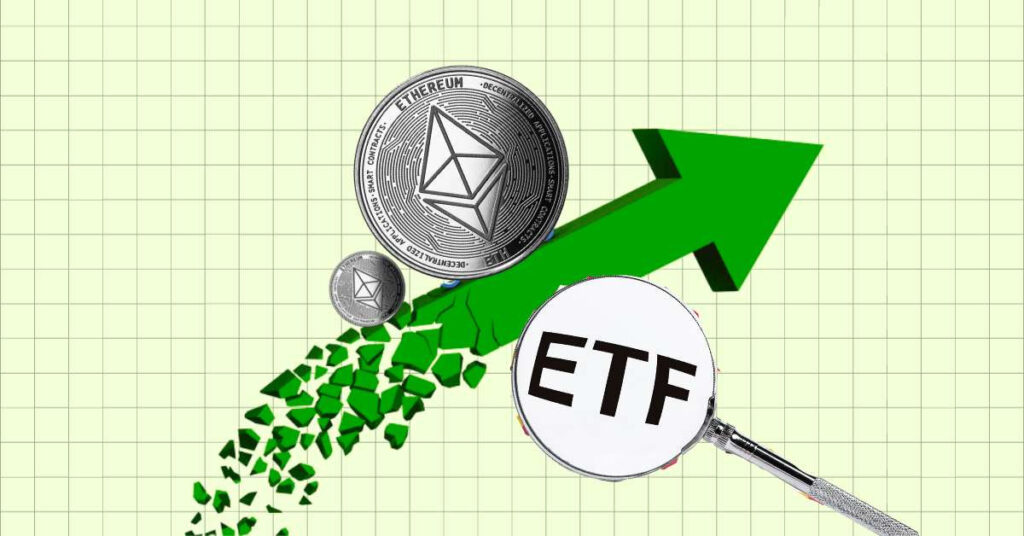Anticipation Grows for the Ethereum ETF Coming in 2024: What Investors Need to Know
Will the finance landscape see an Ethereum ETF coming in 2024? Investors are seeking solid answers. This article strips away the speculation, focusing on the concrete data from regulatory bodies and market analysis to outline what a 2024 Ethereum ETF could mean for the future of investment.
Key Takeaways
- A spot Ethereum ETF is perceived as imminent, with its potential approval influenced by factors such as the SEC’s evolving stance on crypto assets, historical ETF applications, and the crypto market’s maturity.
- The introduction of a spot Ethereum ETF could significantly increase market participation and liquidity, attract institutional investment, and impact Ethereum’s price, with some analysts predicting a post-ETF price of approximately $2,651.93 to $4,800.
- Lessons learned from the journey of Bitcoin ETFs reveal the importance of regulatory acceptance, the challenges of market volatility, and the influence of regulatory precedents on the prospects of Ethereum ETF approval.
The Road to Ethereum ETF Approval

The road to Ethereum ETF approval has been paved with many milestones, from past applications to the evolving stance of the SEC. An ETH spot ETF approval is not only certain but also imminent. This marks a significant development in the cryptocurrency market. Historical applications and the development of the Ethereum ETF landscape have created a ripple of optimism, shaping the current status of approval. The SEC’s stance on crypto assets, including Ethereum, has shown signs of positive evolution, influencing the possibility of an ETF approval. Several factors are expected to influence this approval, including regulatory developments and the increased maturity of the crypto market.
However, one must remember that the journey has not been without its challenges. The SEC has been known for its cautious approach towards crypto ETFs, with several spot Bitcoin ETF applications denied due to concerns such as market manipulation and investor protection. These past experiences have shaped the current landscape and will undoubtedly influence the road to Ethereum ETF approval.
Past Ethereum ETF Applications
The journey towards Ethereum ETF approval has seen several applications, each contributing to the narrative in its unique way. As of now, seven Ethereum spot ETF applications are under consideration by the SEC. One key application is from VanEck, with the SEC setting May 23 as the decision deadline. It’s a race against the clock, and the crypto community is eagerly waiting for the outcome.
However, the SEC’s approach to crypto ETFs hasn’t always been met with applause. It faced criticism for its initial reluctance to approve spot Bitcoin ETFs, with a DC Circuit Judge calling their stance ‘arbitrary and capricious.’ This highlighted the need for consistent regulatory treatment and set the stage for future applications, including those for Ethereum. The legal challenges faced by the SEC due to their inconsistent treatment of Bitcoin spot-market ETFs compared to Bitcoin futures ETFs have also influenced the landscape.
SEC’s Evolving Stance on Crypto Assets

The SEC’s stance on crypto assets has come a long way. In its legal actions against crypto companies, Ethereum has not been classified as a security, providing a positive outlook for the potential approval of Ethereum ETFs. Additionally, the regulated listing of Ethereum futures contracts on the Chicago Mercantile Exchange (CME) signals a maturing perspective from the Securities and Exchange Commission, potentially clearing the path for spot Ethereum ETFs.
However, the road has been bumpy. The SEC’s denial of several spot Bitcoin ETF applications reflects its prior cautious stance towards crypto ETFs. A significant change occurred with the federal appeals court’s ruling in August 2023, which challenged the SEC’s rationale for rejecting a spot Bitcoin ETF application. This evolving stance paints an optimistic picture for Ethereum ETFs.
Key Factors for Approval
Several key factors could influence the approval of an Ethereum ETF. The growing enthusiasm from the traditional finance market indicates a maturity in the market for crypto assets essential for the approval of an ETF. The perceived lower volatility of Ethereum compared to Bitcoin could contribute to a more stable valuation post-ETF approval, bolstering its case.
Institutional investors are showing continued interest in cryptocurrencies, demonstrating demand that could drive the approval for an Ethereum ETF. The SEC’s previous approvals of Bitcoin ETFs have established a regulatory framework that might pave the way for the approval of Ethereum ETFs.
The Potential Impact of a Spot Ethereum ETF

The launch of a spot Ethereum ETF could be a game-changer. It’s expected to:
- Reduce the barriers of entry for traditional investors
- Potentially increase overall market participation and liquidity
- Provide a regulated and secure investment vehicle, which may attract investors concerned about the risks of direct cryptocurrency ownership
- Attract institutional investors who are more comfortable with traditional investment methods and regulatory safeguards
This can lead to larger capital inflows and increased market stability. The domino effect could result in increased demand and investment, driving up Ethereum’s price due to new capital inflows.
Market Growth and Adoption
The potential impact of a spot Ethereum ETF stretches beyond prices. Ethereum’s upcoming upgrades, such as Proto-Danksharding, could make the network more competitive and contribute positively towards an ETH ETF approval due to network maturation. Speculation regarding the approval of an Ethereum ETF can increase interest in existing Ethereum-related funds, indicating growing market anticipation.
Investors anticipating the possible approval of an Ethereum ETF may opt to buy spot ETH directly to gain the most immediate exposure to its price movements. Skilled investors could leverage arbitrage opportunities by exploiting price differences between spot ETH, ether futures, ether spot ETF, futures-based ETFs, and derivatives in the climate of ETF speculation.
Institutional Investors’ Interest
Institutional interest in Ethereum is already significant, with nearly $85 billion of ETH currently staked. The anticipated approval of an Ethereum ETF is likely to further stimulate this interest, providing institutional investors with new avenues for crypto exposure.
The potential approval of an Ethereum ETF is expected to positively affect the market, evidenced by the position of the Grayscale Ethereum Trust implying minimal selling pressure on ETH.
Price Predictions for Ethereum

With Ethereum ETF approval on the horizon, what does this mean for Ethereum’s price? Analysts forecast that Ethereum’s price may reach around $4,800 per ETH following the introduction of a spot Ethereum ETF. However, predictions vary. Binance expects the 2024 price for Ethereum to hover around $2,651.93, while CoinCodex’s 2025 prediction provides a broader price range, estimating Ethereum could fall as low as $2,544.77 or peak as high as $6,510.70.
Changelly Blog provides a moderate view with an average Ethereum price prediction of $3,404.19 for 2024.
Lessons from Bitcoin ETFs
The journey of Bitcoin ETFs provides valuable lessons for Ethereum. The launch of Bitcoin ETFs has shown that regulatory acceptance can come with rigorous standards and scrutiny, as regulators explore the implications of crypto-based financial products. The experience with Bitcoin ETFs demonstrates that obtaining regulatory approvals can involve addressing concerns about market manipulation and the robustness of the price indices used.
Bitcoin ETFs have had a mixed performance with some funds not attracting the expected level of institutional investment, suggesting that the market’s appetite for such products can be overestimated. Nevertheless, Bitcoin ETFs contributed to legitimizing cryptocurrency as an investable asset class, paving the way for other cryptocurrencies to be considered for similar financial products.
Successes and Challenges
Bitcoin ETFs have seen significant successes and faced notable challenges. Some key points to consider are:
- Bitwise’s Bitcoin ETF (BITB) attracted $1 billion in assets, contributing to a collective inflow of more than $15 billion into the ETFs.
- Spot bitcoin ETFs offer investors a regulated investment avenue, reducing the complexity of cryptocurrency wallet management.
- Enhanced liquidity due to spot Bitcoin ETFs may contribute to more consistent prices and improve the process of price discovery in the market.
However, spot Bitcoin ETFs have also navigated challenges including:
- Bitcoin’s market volatility
- Developing a definitive regulatory framework
- The risk of cyber theft
- Management fees affecting returns
- Tracking errors between ETF share prices and Bitcoin’s actual value.
Regulatory Insights
The regulatory landscape for cryptocurrency ETFs has seen significant shifts. The SEC has historically followed a path of initial rejections before granting approval for cryptocurrency ETFs, a trend that might similarly unfold for Ethereum ETFs. The SEC’s approval of Bitcoin ETP shares suggests a maturing viewpoint towards cryptocurrency products, but it’s specific to Bitcoin and compliance with existing regulations.
Despite approval for Bitcoin ETPs, the SEC has emphasized that this does not signal a broader acceptance of all crypto assets under federal securities laws, affecting Ethereum ETF considerations. Approvals of Bitcoin ETFs may set precedents in security and regulatory compliance that could facilitate the eventual approval of Ethereum ETFs.
Comparing Bitcoin and Ethereum ETF Prospects

When comparing the prospects of Bitcoin and Ethereum ETFs, several factors come into play. Influences such as:
- Ethereum’s market size
- Broader use cases in decentralized finance (DeFi) and smart contracts
- Ethereum’s unique role as a platform for decentralized applications
These factors could affect ETF structures and investor appeal. Ethereum’s unique role as a platform for decentralized applications may attract a different investor profile to Ethereum ETFs, interested in the technology’s potential beyond just serving as a store of value.
Although Bitcoin ETFs have created optimism for similar products, Ethereum’s smaller market size may influence the scale and liquidity of Ethereum ETFs upon their introduction. Ethereum’s prominence as a preferred blockchain platform for developers and for tokenized assets positions it favorably in TradFi institutions’ consideration for spot ETF products. However, uncertainty remains as the SEC’s approval for Bitcoin ETNs does not guarantee the SEC’s approval for ETFs of other cryptocurrencies, including Ethereum.
Preparing for an Ethereum ETF: Investment Strategies

As the anticipation for an Ethereum ETF builds, investors can prepare for this potential game-changer by diversifying their crypto portfolios, timing the market, and managing risks. An ETF, or exchange-traded fund, is a type of investment fund and exchange-traded product, meaning they are traded on stock exchanges. Ether ETFs, also known as ETH ETFs, provide the advantage of trading Ethereum without the challenges of direct crypto asset management. However, crypto markets are volatile, often correlating with hype cycles in technology, thus evaluating an ETF’s historical performance can be a good indicator of potential future returns. In this context, considering exchange traded funds as an investment option can be beneficial for investors.
Diversifying Crypto Portfolios
Diversification is a key strategy in crypto investing to spread risk. Ensuring that the decline in value of some crypto assets may be balanced by stability or gains in others is crucial. Investors can diversify their crypto portfolios through a mix of digital tokens, including large-cap or small-cap cryptocurrencies, stablecoins, and utility tokens.
Diversifying through derivatives like futures contracts, options, and perpetual swaps offers advanced crypto traders more complex and higher-risk financial instruments. Crypto portfolio diversification can also be achieved by investing in publicly traded companies in the cryptocurrency sector and in cryptocurrency funds like ETFs. An Ethereum ETF, operating as a regulated, diversified crypto fund, could provide investors with an additional means to manage risk in their investment strategies.
Timing the Market
Timing the market in anticipation of an Ethereum ETF is another strategy investors could consider. Purchasing call options on ETH or Ethereum-based ETFs offers a leveraged position that can be used as a market timing strategy. However, investing in call options entails a higher risk and cost, including the premium paid for the options, which can impact the timing of market entry and potential returns.
Ethereum ETF approval is not a certainty, which introduces variability in attempting to time the market for such investments. Therefore, investors should consider their own risk tolerance and market predictions when deciding on market timing strategies for a potential Ethereum ETF.
Risk Management

Risk management is pivotal when preparing for an Ethereum ETF. It’s advisable to adopt a conservative investment approach by allocating only funds you can afford to lose. Utilizing cold storage solutions, like hardware wallets offered by companies like Ledger or Trezor, protects investments from risks of hacks or insolvency associated with centralized exchanges. Asset managers should also consider these measures to ensure the security of their clients’ investments.
Applying hedging techniques within a cryptocurrency portfolio can manage exposure to market fluctuations while acknowledging the potential limitation on gains. Some hedging techniques to consider are:
- Dollar cost averaging
- Options
- Futures
- Yield farming
Additionally, limiting the use of leverage in trading can avoid exacerbating risks, especially considering the extreme volatility often experienced in cryptocurrency markets.
Summary
In conclusion, the anticipated approval of an Ethereum ETF in 2024 could be a game-changer, potentially increasing market participation, attracting institutional investors, and driving up Ethereum’s price. However, the journey to approval is not without its challenges, and lessons from the Bitcoin ETF saga provide valuable insights for what lies ahead. Investors can prepare for this potential game-changer by diversifying their crypto portfolios, timing the market, and managing risks. As we await the final decision, one thing is clear – the crypto world is on the cusp of a new era.
Frequently Asked Questions
What is an Ethereum ETF?
An Ethereum ETF is an investment fund that tracks the price of Ethereum and is traded on traditional exchanges, offering a regulated and secure investment option for investors without the complexities of managing crypto assets.
How does the approval of Bitcoin ETFs affect Ethereum ETFs?
The approval of Bitcoin ETFs sets a regulatory precedent for potential approval of Ethereum ETFs, but it doesn’t guarantee Ethereum ETF approval by the SEC.
How can I prepare for an Ethereum ETF?
To prepare for an Ethereum ETF, consider diversifying your crypto portfolio, staying updated on regulatory developments, and managing risks through strategies like hedging and limiting leverage. Good luck!
What could be the impact of a spot Ethereum ETF?
A spot Ethereum ETF could lead to increased market participation and liquidity, attracting traditional and institutional investors, and potentially driving up Ethereum’s price.
What are the key factors for the approval of an Ethereum ETF?
The key factors for the approval of an Ethereum ETF include market maturity, lower volatility of Ethereum compared to Bitcoin, interest from institutional investors, and regulatory developments. These factors are expected to play a significant role in the approval process.

